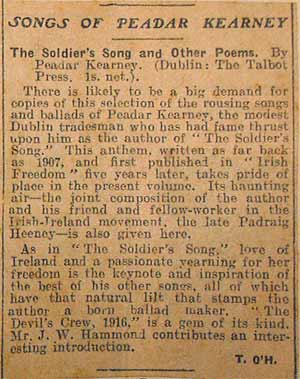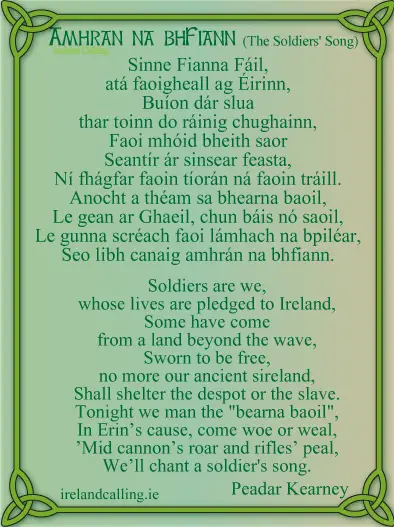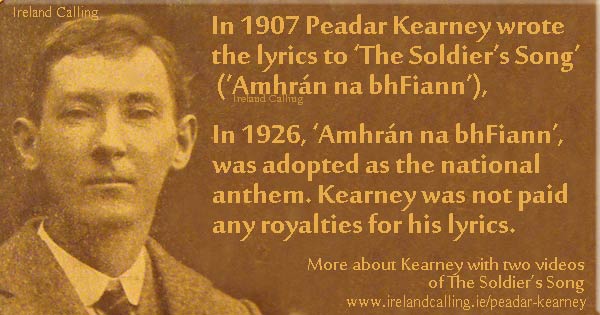Peadar was an Irish republican and writer of rebel songs. He is best remembered for the lyrics to “The Soldier’s Song” (“Amhrán na bhFiann”), which he wrote in 1907.
This song is now the official national anthem of the Irish Republic.
He was born in Dublin and left school at 14 to and got a job as an apprentice house painter. In the evenings he taught Irish (Sean O’Casey was one of his students).
Gaelic League
In 1901, Kearney joined the Gaelic League (Conradh na Gaeilge) which promotes the Irish language in Ireland and across the world.
In 1903, he became a member of the Irish Republican Brotherhood, and he became involved in the restoration of the derelict Abbey Theatre and helped backstage when it reopened in December 1903. He toured with the theatre company and sometimes had small walk-on parts.

The Soldier’s Song
In 1909 Patrick Heeney (a musician), composed music for Kearney’s lyrics of The Soldier’s Song, which he wrote in 1907.
Kearney was a co-founder of the Irish Volunteers in 1913, which was a military organisation of Irish nationalists.
It was formed in response to the formation of the Ulster Volunteers in 1912. Its aim was “to secure and maintain the rights and liberties common to the whole people of Ireland”.
The Soldier’s Song was often sung at Republican gatherings, especially after the Irish Volunteers.
Easter Rising 1916
Kearney was a close friend of Michael Collins. When the Easter Rising of 1916 broke out, he was touring with the Abbey Theatre company in England. He returned to Dublin, and fought at Jacob’s biscuit factory. He escaped capture.
After Michael Collins death in an ambush in 1922, he was disillusioned and never took part in politics again. He returned to his old job as house painter.
Amhrán na bhFiann becomes Irish National anthem
In 1926, “Amhrán na bhFiann”, was adopted as the national anthem. Kearney was not paid any royalties for his lyrics of the song.
He wrote many other well-known ballads, including The Bold Fenian Men (Down by the Glenside) and The Tri-Coloured Ribbon, Down by the Liffey Side, Knockcroghery, and Erin Go Bragh.

Great Irish quotes – a flair for the memorable quote
Irish History – quick, easy-to-read summaries
Easter Rising 1916 – six days that changed course of history
